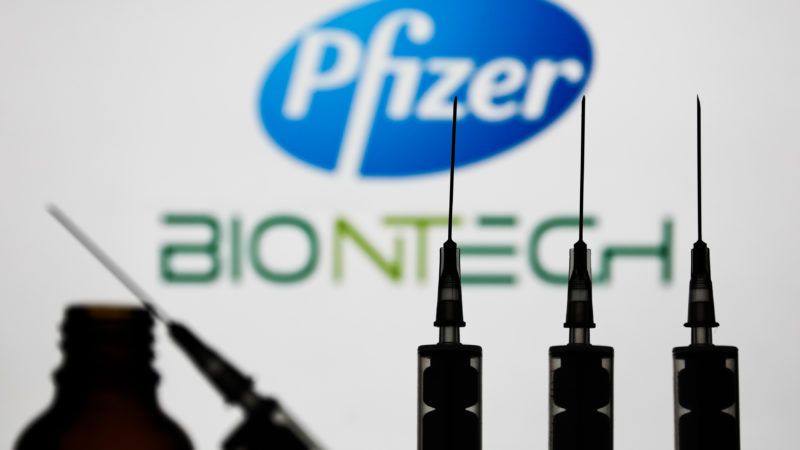Pfizer/BioNTech COVID-19 Vaccine Is 95% Effective
Companies plan to seek emergency use authorization from the FDA almost immediately.

The clinical trial safety and efficacy results from Pfizer/BioNTech's vaccine for the virus that causes COVID-19 are now in and they are impressively positive. In the trial, 170 confirmed cases of COVID-19 were evaluated, with 162 observed in the placebo group versus eight in the vaccine group. Nine severe cases of COVID-19 occurred in the placebo group, whereas only one such case was observed among the vaccinated group. Based on these figures, the vaccine is 95 percent effective against COVID-19. The companies further report that "efficacy was consistent across age, gender, race and ethnicity demographics; observed efficacy in adults over 65 years of age was over 94 percent." The independent data monitoring committee for the trial identified no significant safety concerns with the vaccine.
The companies announced that they plan to submit a request within days to the U.S. Food and Drug Administration (FDA) for emergency use authorization (EUA). These data will be reviewed in a public session by the FDA's Vaccines and Related Biological Products Advisory Committee (VRBPAC) prior to the issuance of any EUA for a COVID-19 vaccine. The VRBPAC is composed of nongovernment scientists, physicians, and other experts who make recommendations for or against regulatory approval based on their evaluation of the benefits and risks of candidate vaccines. Taking into account the committee's recommendations, the FDA will decide whether authorization is appropriate.
If approved, the companies expect to produce up to 50 million vaccine doses in 2020 and up to 1.3 billion doses by the end of 2021.
Right behind the Pfizer/BioNTech partnership is Moderna, which earlier this week reported that its COVID-19 vaccine candidate was also nearly 95 percent effective according to preliminary results of its ongoing clinical trial. Moderna expects to have accumulated enough data to meet the FDA's safety and efficacy requirements enabling it to submit its EUA by the end of this month. If approved, the company expects to have approximately 20 million doses of its vaccine ready to ship in the U.S. by the end of 2020 and aims to manufacture 500 million to 1 billion doses globally in 2021.
Earlier this week a team of American researchers published a preprint study concluding that the body's immune memory for fighting off the COVID-19 coronavirus could last for years, perhaps decades. "That amount of memory would likely prevent the vast majority of people from getting hospitalized disease, severe disease, for many years," said Shane Crotty, a virologist at the La Jolla Institute of Immunology who co-led the new study, to The New York Times.
States are in various stages in their planning for distributing the vaccines when they become available. One highly useful development is that earlier this month the Department of Health and Human Services worked out agreements to distribute the vaccines with major pharmacy chains like Rite Aid, Walgreens, and CVS, supermarket drug stores like Albertsons and Publix, and big box stores like Costco and Walmart. CVS and Walgreens will also deliver vaccines to nursing homes and administer shots. The idea is that getting a COVID-19 inoculation should be about as easy as getting a seasonal flu shot.
In his company's press release, Pfizer CEO Albert Bourla observes that the results of the clinical trial "mark an important step in this historic eight-month journey to bring forward a vaccine capable of helping to end this devastating pandemic." He is entirely correct. Had this pandemic broken out even 10 years ago, the world had not then developed the biotechnology tools that now make it likely that it can be tamed in just a little over a year.


Show Comments (91)